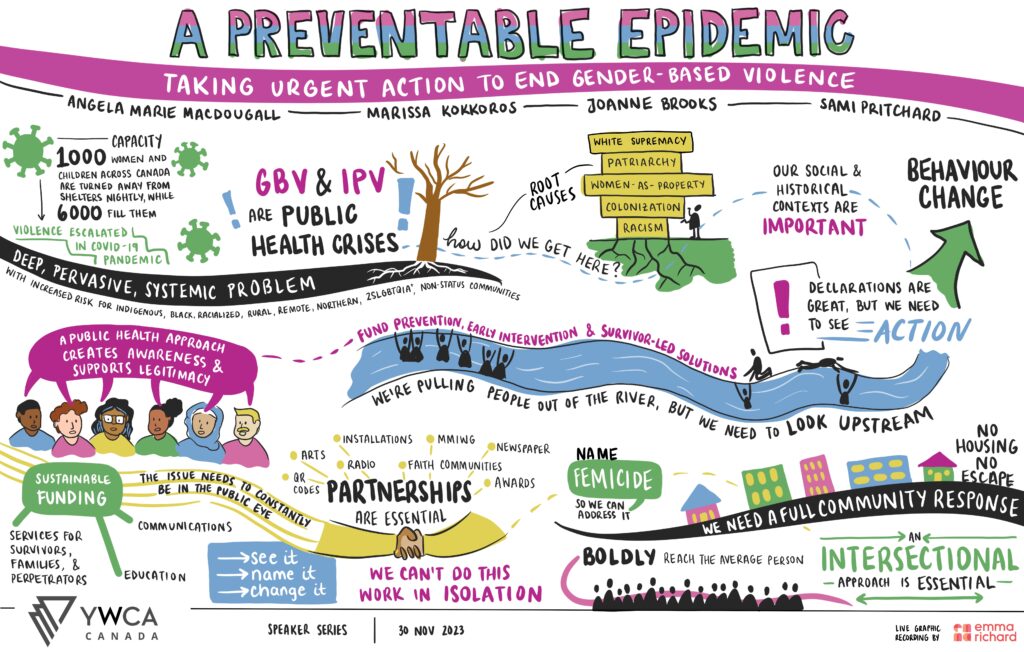Read: 4minutes
Gender-based violence (GBV) and intimate partner violence (IPV) is a global concern that happens every jurisdiction, riding, and community in Canada. Individuals experiencing gender-based violence find themselves in emergency situations every day.
During the 16 Days of Activism Against Gender-Based Violence, YWCA Canada organized a panel event “A Preventable Epidemic: Taking Urgent Action to End Gender-Based Violence” This event welcomed compelling dialogue featuring Angela Marie MacDougall (Executive Director at the Battered Women’s Support Services), Marissa Kokkoros (Executive Director at Aura Freedom International), JoAnne Brooks (Coordinator at the Ending Violence Against Women Committee of Renfrew County), and Sami Pritchard (Interim Director of Advocacy and Communications at the YWCA Toronto).
Throughout the discussion, the panelists discussed public health concerns impacting survivors across Canada, stressed the significance of declaring GBV and IPV as an epidemic, addressed the persistent challenges faced by survivors, and outlined avenues for individuals to actively engage in preventing GBV and IPV while supporting communities that work in advancing gender equity. Participants learned more about each panelist and gained insight into their ongoing advocacy efforts at various levels and across Canada.
Here’s a summary of standout points we’ve gathered from this discussion:
- Angela Marie MacDougall emphasized the roots of GBV and IPV, linking them to societal stratification along gendered lines and how patriarchy is the lay of the land. Recognizing Canada as a settler colonial nation, she highlighted the oppression reflected in statistics on Missing and Murdered Indigenous Women and Girls (MMIWG). Then, she pointed out the importance of maintaining a social-historical context when we are looking for policy solutions. She declared behavioral change and GBV as an epidemic are both a priority. Marissa Kokkoros emphasized the need to address the root causes of GBV because there is no quick fix. She advocated for a public health approach to gain government and societal support, emphasizing the need for intersectionality in addressing patriarchy, white supremacy, and colonialism. She saw the declaration of GBV and IPV as epidemics a mobilizing force to unite the world against these issues, stressing the importance of community buy-in. From JoAnne Brooks‘ rural perspective, there is a necessity of legitimacy in addressing these issues to secure funding for sustained public awareness campaigns. JoAnne advocates for consistent messaging through various media channels and its role in creating awareness and promoting a cultural shift. She stressed the importance of funding sustainability for services not only for survivors and families, but also for perpetrators, alongside early education on healthy relationships.
- After stressing the necessity of declaring GBV and IPV as an epidemic, our panelists shared their ongoing advocacy work. JoAnne Brooks shared that her advocacy work and goals focused on consistently bringing issues of intimate partner violence (IPV) and gender-based violence (GBV) into the public eye. EVA has employed creative strategies, such as the “See it, Name it, Change it” public education program, which developed curriculum for schools, community groups, and youth programs. The organization has initiated community-engaging projects like creating monuments honoring sexual assault survivors and victims, and fostering community conversations. Marissa Kokkoros added that Aura Freedom’s “Body Bag for Her” campaign, launched during 16 Days of Activism against Gender-Based Violence, is calling attention to the urgent action needed to recognize feminicide in Canada. As Marissa highlighted, the government of Canada doesn’t yet recognize or address femicide. Angela Marie MacDougall introduced her organization’s campaign, “No Housing, No Escape,” addressing the housing crisis’s intersection with intimate partner violence. This campaign challenges the common question of why survivors don’t just leave abusive relationships, emphasizing the profound challenges survivors face in making such decisions. The campaign aims to underscore the impossibility of escaping violence without safe and affordable housing.
- The discussion ended by highlighting how people can support survivors and dismantle barriers. Marissa Kokkoros stressed the key role of intersectionality, particularly for migrant and immigrant women, Indigenous women, women living with disabilities, and other women trying to access shelters. Angela Marie MacDougall echoed this sentiment, highlighting that their organization is deeply rooted in intersectionality. She introduced “The Colour of Violence,” a multi-year project exploring the relationship of race and gender, and the meaning of intersecting identities for survivors of violence. Angela also noted the overall lack of support, with many survivors lacking trust in the police due to perceived ineffectiveness in addressing harm. JoAnne Brooks brought attention to the challenges in rural areas, where vast distances can impede timely police assistance, creating unsafe conditions. She pointed out that almost 80 municipalities have declared GBV and IPV an epidemic, emphasizing the need for a shift in behavior and proactive federal action.
Emma Richard, a graphic recorder and illustrator, captured the essence of this enlightening conversation through visual representation. Click here to view!
Are you ready to make a tangible impact on your own terms? Here are actionable steps you can take sign, share, and follow to drive meaningful change.
- As a part of our 16days of activism against GBV, YWCA Canada is calling on elected officials to declare GBV and IPV an epidemic. Click here and sign a letter to your representative
- YWCA Toronto’s campaign urging the provincial government to declare IPV and GBV an epidemic Home. Click here to be a part of this incredible movement and make significant change in the level of Ontario!
- Click here and sign the Petition of Aura Freedom to call on the Government of Canada to take the meaningful steps towards ending femicide across the country and to declare femicide an emergency in Canada.
